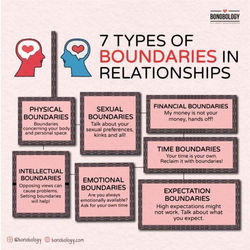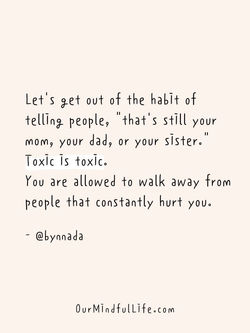RELATIONSHIPS
WHAT IS HEALTHY AND NOT HEALTHY?
When we experience difficulties or changes in a relationship – with a partner, friend or family member – it can affect our mental health in many ways.
Disagreements are a normal part of relationships, but if you and your partner regularly snap at each other, give or get the cold shoulder, or find it hard to resolve arguments, it can affect your and your children's mental wellbeing, including babies and young kids.
Healthy relationships involve honesty, trust, respect and open communication between partners and they take effort and compromise from both people. There is no imbalance of power. Partners respect each other's independence, can make their own decisions without fear of retribution or retaliation, and share decisions.
RELATIONSHIPS WITH FRIENDS:
Friendships have a huge impact on your mental health and happiness. Good friends relieve stress, provide comfort and joy, and prevent loneliness and isolation. Developing close friendships can also have a powerful impact on your physical health
Technology has shifted the definition of friendship in recent years. With the click of a button, we can add a friend or make a new connection. But having hundreds of online friends is not the same as having a close friend you can spend time with in person. Online friends can’t hug you when a crisis hits, visit you when you’re sick, or celebrate a happy occasion with you. Our most important and powerful connections happen when we’re face-to-face. So make it a priority to stay in touch in the real world, not just online.
The most important quality in a friendship is the way the relationship makes you feel—not how it looks on paper, how alike you seem on the surface, or what others think. Ask yourself:
-
Do I feel better after spending time with this person?
-
Am I myself around this person?
-
Do I feel secure, or do I feel like I have to watch what I say and do?
-
Is the person supportive and am I treated with respect?
-
Is this a person I can trust?
The bottom line: if the friendship feels good, it is good. But if a person tries to control you, criticises you, abuses your generosity, or brings unwanted drama or negative influences into your life, it’s time to re-evaluate the friendship. A good friend does not require you to compromise your values, always agree with them, or disregard your own needs.
RELATIONSHIP BREAKDOWNS:
Despite what we might hope, relationships don’t always last forever. When relationships break down, it is difficult for everyone involved.
WHAT CAN HELP?
'Self-help' tips don't solve the issue. However, they can help you/others feel more in control when experiencing strong emotions.
If you find that 'self-help' isn't enough, consider reaching out to a counsellor or your GP for help managing overwhelming emotions.
01
Take the time to appreciate yourself and�� get in touch with your emotions to be able to express yourself clearly and more effectively. Not knowing how to regulate your emotions and express them healthily can negatively affect your mental wellbeing.
02
A healthy relationship needs commitment and willingness to be accommodating to each other’s needs.
03
All relationships have disagreements and that’s ok. what matters is how you talk and listen to one another.Listen to understand, rather than listening to respond
04
Don’t be afraid to express your emotions or vulnerabilities with people you trust.
05
If you have a healthy way of expressing your feelings, you’re able to react to other people’s in a healthy way. Being angry with someone often comes from a place of feeling hurt and upset. if you can recognise that, you can communicate it, and build better relationships with others.
06
Reflect on the relationships that work best in your life, what qualities do these relationships have, and how can you bring these qualities into other relationships?
07
If you expect to get what you want 100% of the time in a relationship, you are setting yourself up for disappointment. Healthy relationships are built on compromise. However, it takes work on each person’s part to make sure that there is a reasonable exchange.
08
Be supportive. This applies in good times and in bad. Make an extra effort to reach out and offer a helping hand, a listening ear
Families come in all kinds of combinations, but it can be a really upsetting, confusing and stressful time when relationships between family members
break down. If there are disagreements or arguments, this can make home life really tough which can impact how a person feels, how they cope at
school/college or work, and even whether they want to take part in activities or spend time with family and friends.
Lots of young people worry about their parents/carers and siblings during a separation, or when there are arguments. It can also be hard if parents
separate and one of them meets a new partner. you may have to move house or live with new people. you may worry about how often you might see their
family, or worry about how the family might cope. It is not uncommon that some people to worry about having enough money. It’s not uncommon for
young people to worry about whether their parents' separation is their fault.
When families experience a separation or a big change, it can take a while for all family members to understand, process and adjust to these changes. There is no right or wrong way to feel, think or behave; everyone processes change differently. Some days you may feel more able to cope than other days. It is important to be aware that some family members may struggle more than others with the changes.
Despite the feelings you might have, in time things will get better. You need time to come to terms with what has happened and you may find yourself
dreaming about getting back together again. The sooner you accept your relationship is truly over the sooner you can get your own life back on track.
The most important thing to do after a separation is to look after yourself. Don't isolate yourself from your friends and family, try to maintain
communication with people whom you feel at ease talking to, be they family members, mates, colleagues or even talking to a counsellor can help. You also
need to allow yourself time to grieve and let go of any residing anger you might have.
It’s not easy dealing with the aftermath of a relationship breakdown, but it's important to remember you'll have good days and bad days - just like
everybody else. Because separation can be an extremely distressing time, it’s also a good idea to try to give yourself time to unwind and let your body de-
stress. Do what makes you feel relaxed, whether it’s watching the footy or meeting your mates for a catch-up – laughter can be a great therapy so make
sure you allow yourself to have some fun – or at least some time away from dwelling on what has happened.
Learning to accept that a relationship has come to an end can be difficult, but there are some things that can help:
-
allowing time to get over the breakup;
-
let your feelings out;
-
distract yourself and keep busy with new (or old) interests, physical
-
activity, social events, travel;
-
surround yourself with close friends;
-
relax;
-
talk to someone about how you’re feeling;
-
stop thinking about the past and start looking ahead.
FAMILY RELATIONSHIPS:
Family relationships are also difficult at times, not every family gets along. Sometimes, it can feel like your family doesn't understand what you’re going through or how you’re feeling, or you may generally clash with them for no apparent reason. No family is perfect and it’s common for families to have their ups and downs. There are lots of different reasons why you might be struggling with family.
If you are finding it tough to get along with your family, it can make you feel lonely, anxious, overwhelmed or angry. If you feel like this, that’s okay. No two families are the same, but every family will have its differences or difficulties – this is completely normal.
WHY ARE BOUNDARIES IMPORTANT?
As with all relationships, it is important to set boundaries. Boundaries are a way to take care of ourselves. When you understand how to set and maintain healthy boundaries, you can avoid the feelings of resentment, disappointment, and anger that build up when limits have been pushed.
Building healthy boundaries — whether you’re at work, at home, or hanging out with friends — hinges on understanding the types of boundaries.
There are five different types:
-
Physical. This refers to your personal space, your privacy, and your body. You might be someone who is comfortable with public displays of affection (hugs, kisses, and hand-holding), or you might be someone who prefers not to be touched in public.
-
Sexual. These are your expectations concerning intimacy. Sexual comments and touches might be uncomfortable for you.
-
Intellectual. These boundaries concern your thoughts and beliefs. Intellectual boundaries are not respected when someone dismisses another person’s ideas and opinions.
-
Emotional. This refers to a person’s feelings. You might not feel comfortable sharing your feelings about everything with a friend or partner. Instead, you prefer to share gradually over time.
-
Financial. This one, as you guessed, is all about money. If you like to save money — not spend it on trendy fashions — you might not want to loan money to a friend who does.
EXTERNAL INFORMATION, SUPPORT AND ADVICE






















































 |  |  |  |  |
|---|---|---|---|---|
 |  |  |  |  |
 |  |  |  |  |
 |  |  |  |  |
 |  |  |  |  |
 |  |  |  |  |
 |  |  |  |  |
 |  |  |  |  |
 |  |  |  |  |
 |  |  |  |  |
 |  |  |  |  |
 |  |  |  |  |
 |  |  |  |  |
 |  |  |  |  |
 |  |  |  |  |
 |  |  |  |  |

